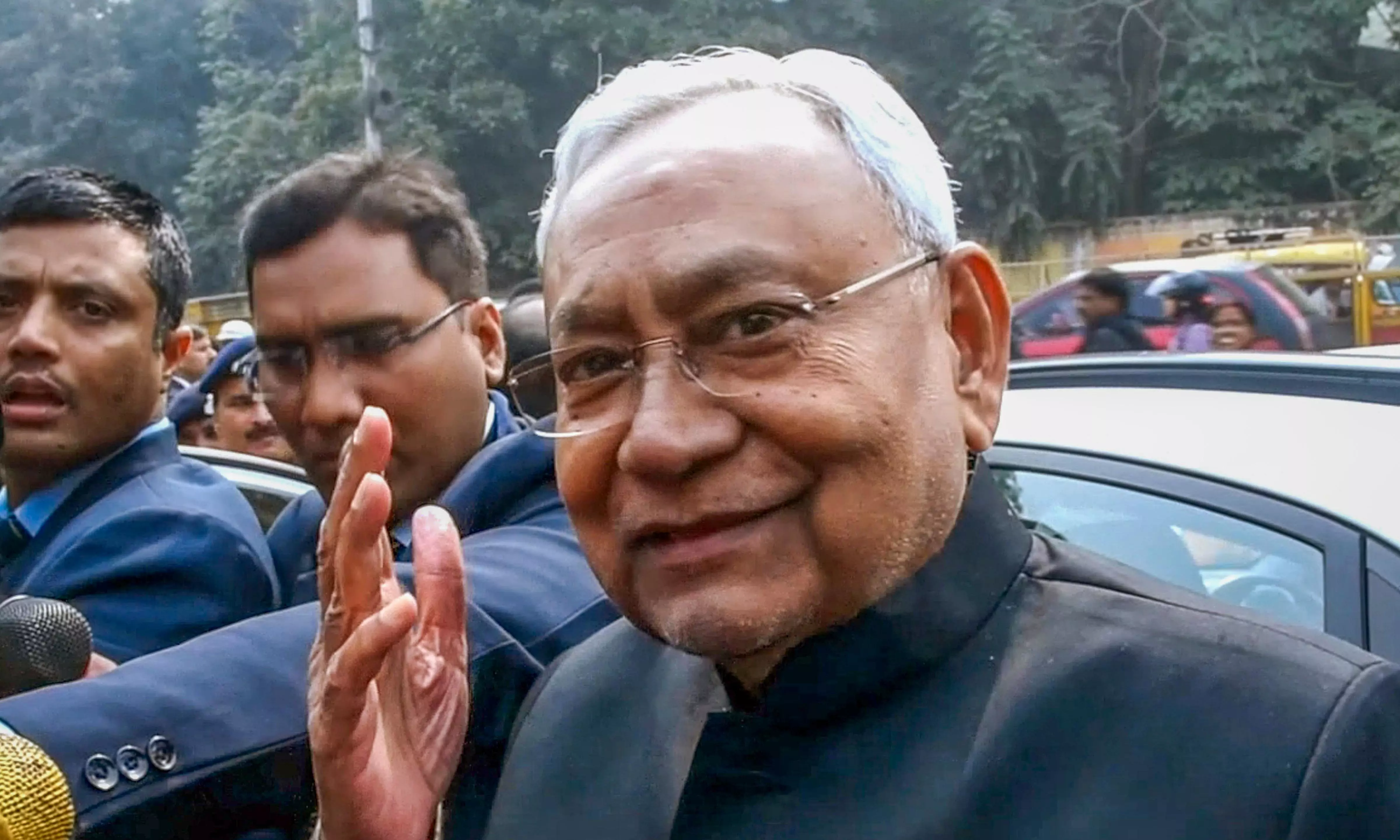
- Home
- India
- World
- Premium
- THE FEDERAL SPECIAL
- Analysis
- States
- Perspective
- Videos
- Sports
- Education
- Entertainment
- Elections
- Features
- Health
- Business
- Series
- In memoriam: Sheikh Mujibur Rahman
- Bishnoi's Men
- NEET TANGLE
- Economy Series
- Earth Day
- Kashmir’s Frozen Turbulence
- India@75
- The legend of Ramjanmabhoomi
- Liberalisation@30
- How to tame a dragon
- Celebrating biodiversity
- Farm Matters
- 50 days of solitude
- Bringing Migrants Home
- Budget 2020
- Jharkhand Votes
- The Federal Investigates
- The Federal Impact
- Vanishing Sand
- Gandhi @ 150
- Andhra Today
- Field report
- Operation Gulmarg
- Pandemic @1 Mn in India
- The Federal Year-End
- The Zero Year
- Science
- Brand studio
- Newsletter
- Elections 2024
- Events
- Home
- IndiaIndia
- World
- Analysis
- StatesStates
- PerspectivePerspective
- VideosVideos
- Sports
- Education
- Entertainment
- ElectionsElections
- Features
- Health
- BusinessBusiness
- Premium
- Loading...
Premium - Events

BJP’s moves to tie up with Nitish again and appropriate near-forgotten icon Karpoori Thakur suggest that it still feels the need to weaken INDIA bloc
The flip side to Nitish Kumar’s flipflop would be, what else, flop. Nitish Kumar has probably run out of rope and the limit of stretchability of the rope’s elasticity.
The BJP would dump him as soon as it has milked the EBC sap many believe he still contains inside him in the 2024 general elections. Nitish has styled himself as the champion of the Extremely Backward Castes (EBCs).
The BJP had already demonstrated its intention to conclude Nitish Kumar’s long ride as a political leader by deploying Chirag Paswan in the 2020 Assembly elections, to set up a glorious sunset into which Nitish could disappear.
Paswan equation
Paswan, although formally a part of the BJP-led National Democratic Alliance (NDA), had rebelled against Nitish, split votes that should have consolidated for Nitish’s Janata Dal (United) candidates, and rendered the JD(U) the BJP’s junior partner in terms of the electoral outcome.
The BJP still made him the chief minister of the NDA government but began to chip away at his authority as chief minister, and the party’s central leadership treated him with disdain.
Nitish avoided humiliation at the hands of the BJP by dumping his partner in 2022 before his partner dumped him. The Opposition combine’s desire to deprive the BJP of power in a major state persuaded them to overlook Nitish’s past infidelities and offer him support as chief minister of a non-BJP coalition.
Blame voters
It is easy to find fault with Nitish for his fickle loyalties and variable commitment to all things other than his own political well-being. This is facile, and implicitly forgives the voters and allies who take defections in their stride and keep voting for or befriending individual leaders and parties, regardless of what company they keep and what policies they, thereby, foster.
If voters elect and support a leader who claims to oppose communalism, and vote for him again the next time around, even after that leader has defected to a party that patronises lynch mobs, why blame just the leader, and not his voters?
If they fail to see any connection between whom they vote for and the policies enacted by a government supported by, or, as in Nitish’s case, headed by, their elected representative, why blame the leader alone?
Incentivising politicians
Politicians respond to incentives and disincentives. Continued popular support is an incentive, decline in support a disincentive. Nitish changed his loyalties roughly once in two years over the past decade.
If that has not deprived him of eager would-be allies across the political spectrum, or revolted his voters, why should he not change his spots again?
The short point is that people get the leaders they deserve. Leaders reflect the political sensibility of the people, complete with warts and dimples.
BJP's confidence
What is remarkable about Nitish’s latest political somersault is what it says about the BJP’s confidence in its electoral prospects in Bihar.
At one level, it could be argued that having demonstrated the fragility of the INDIA alliance is the biggest gain for the BJP from getting Nitish to defect. But that is not all that is there to it. The BJP-led government at the Centre bestowed India’s highest civilian honour on a political leader who had faded from the memory of today’s generation of voters, Karpoori Thakur.
Thakur’s claim to fame is that he championed social justice politics before it was called social justice politics, introducing reservation for backward castes in government jobs when he was chief minister for two brief periods in the 1970s.
His policies did not endure because there was no unanimous backing for his policies within his party or the elected representatives whose leader he nominally was.
Weak Opposition
The BJP’s move to appropriate this near-forgotten icon of backward class empowerment, by honouring him with the Bharat Ratna, while hoping that no one would notice that Thakur’s socialist politics had zero overlap with the BJP’s ideology of combining religion and nationalism, reinforces the perception that, in Modi’s eyes, Modi ki Guarantee is not enough, by itself, to win the 2024 general elections.
There are many things in the BJP’s favour. The largest Opposition party is being led astray, meandering across theland, by its ever-youthful leader, who surrounds himself with advisors and sycophants who cannot win elections and deem themselves to be above the vulgar fray.
Other Opposition leaders are loath to accept his leadership, and pre-empt pre-poll alliances of any substantive kind in their own areas of strength. The media is, by and large, pliant, and allows the government to treat the Enforcement Directorate (ED) as a partisan dog of war that can be sicced, at will, on Opposition leaders.
Corruption stink
India has slipped 8 places to rank 93rd on Transparency International’s Corruption Perception Index for 2023, the latest. The most scope for corruption is with those who wield power.
The BJP wields most power in the country, at the Centre and in the states. Yet, the government and the ED behave as if corruption were the monopoly of the Opposition.
The electronic voting machines (EVMs), ever since these were modified to create a Voter Verified Paper Audit Trail (VVPAT), have become vulnerable to hacking when in the custody of colluding officials. That audit trail in VVPAT is a misnomer. There is no audit whatsoever.
Voting issues
The electoral law should be modified to an audit: mandate safe storage and counting of the marked paper slips that are created when a voter registers his preference by pressing the button against the symbol of the party he/she is voting, in special cases.
These special cases could be close contests or unusual results, in which the votes of smaller parties have shrunk dramatically to suggest possible reallocation of votes, via malware, in the electronic output.
Despite these advantages, not to speak of the emotive upsurge most observers credit the Ram Mandir with, the BJP still feels the need to weaken the INDIA alliance and woo the most backward castes via honouring a dead icon and by inveigling a supposed champion of Bihar’s Extremely Backward Castes to defect to the NDA. If there is no chink in the armour, why fortify it?(The Federal seeks to present views and opinions from all sides of the spectrum. The information, ideas or opinions in the articles are of the author and do not necessarily reflect the views of The Federal.)


